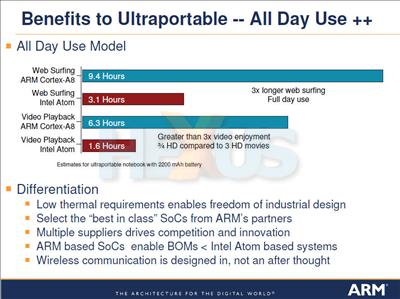Conclusion
Funnily enough, one recent manifestation of the ARM/Linux solution occurred alongside Intel processors in a piece of Dell technology called Dell Latitude ON. This appears to be a hybrid proposition that allows you to switch between the ARM/Linux state and a full Intel/Windows set-up depending on what the user wants to do.
We could find surprisingly little information on the web about this, but here's a Dell teaser vid from last August.
In conclusion, if ARM products really can perform as well as Atom at a third of the power, Intel is going to have to raise its game in the low power processor sector, otherwise it may find itself sidelined in this critical market.
This does present Intel with a dilemma, however. The better it gets at producing cheap, low power processors, the less demand there's likely to be for its traditional offering of high-performance CPUs.
We asked Morris if he agreed with NVIDIA's assertion that Intel is scared of its own creation in Atom. "Intel's been running platforms for years and now it's trying to contain the Atom market," he said. But that's looking like an increasingly difficult thing to do and it will be interesting to see how Intel responds to this challenge, as it surely will.














